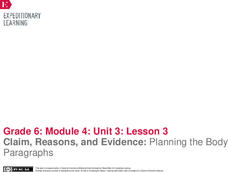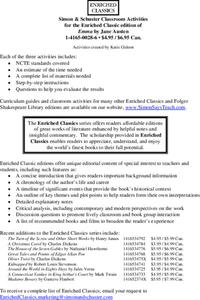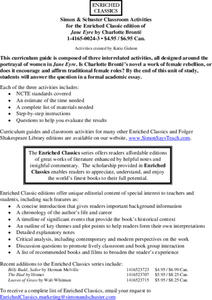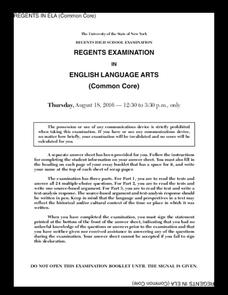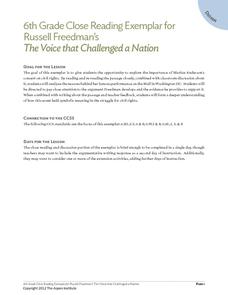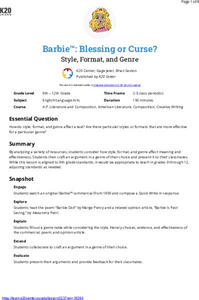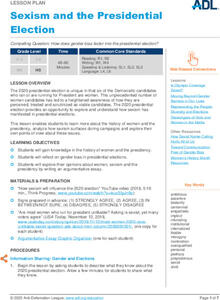Curated OER
Argumentation and Logic
Students recognize inductive and deductive reasoning and analyze common fallacies in critical thinking. In this argumentation and logic lesson, students use role playing activities and specific instances of inductive and deductive...
EngageNY
Claim, Reasons, and Evidence: Planning the Body Paragraphs
Planning is the key to success. Scholars continue planning their essays by adding reasons to their Planning My Argument graphic organizers. Additionally, pupils analyze a body paragraph from a model position paper, identifying the...
Curated OER
Writing Persuasion Papers: Thesis Statement
Using a "Hamburger" essay outline and actual hamburger buns, you will demonstrate the role a thesis plays in a persuasive essay. This is a simplistic visual representation of how an argumentative paper should be composed and not an...
Curated OER
Writing a Speech
In this writing a speech worksheet, students will read two paragraphs from a speech, then match 16 descriptions of parts of a speech with a phrase or sentence in the speech by drawing a line from the description to the text.
College Board
2009 AP® English Language and Composition Free-Response Questions
Exploration comes at a cost. A set of questions designed for the AP® English Language and Composition exam includes an argumentative prompt about the cost of space exploration. Writers review sources to develop their position before...
College Board
2007 AP® English Language and Composition Free-Response Questions Form B
Do museums offer eyes into the past? Scholars synthesize sources to make a claim in an essay about the importance each museum artifact deserves. Pupils also write to analyze journalist level of ethics as well as a speech by Wendell...
EngageNY
Grade 10 ELA Module 3: Unit 3, Lesson 6
And that's a wrap! Scholars create their concluding statement drafts by examining model text with exemplar conclusions. In pairs, they discuss how transitional words and phrases add to sentence structure and consider how their concluding...
College Board
2015 AP® English Language and Composition Free-Response Questions
Many schools have honor codes, but scholars do not always choose to follow them. As part of a series of free-response questions from the AP® English Language and Composition Exam, learners discuss the benefits or disadvantages of honor...
EngageNY
Pitching Your Claim with Best Evidence
Does Bud use his rules to survive or thrive? That is the driving question of a lesson plan following the reading of Bud, Not Buddy by Christopher Paul Curtis. In an argument essay prewriting activity, pupils use textual evidence to...
New York State Education Department
English Language Arts Examination: June 2016
The English Language Arts Examination handout contains a variety of multiple-choice questions to assess reading comprehension, in addition to a source-based argument essay and text-analysis response prompts.
New York State Education Department
English Language Arts Examination: June 2017
Plants prefer classical music to rock and roll. That's one of the claims in an informational passage that makes up part of a set of standardized assessment questions. The set is part of a larger collection of English language arts tests...
Simon & Schuster
Classroom Activities for Emma by Jane Austen
Coldhearted snob or warm and caring? A series of activities prepares scholars to evaluate the main character in Jane Austen's Emma. To begin, class members compare the gender expectations for women in Regency England and those of today....
Simon & Schuster
Classroom Activities for Jane Eyre by Charlotte Brontë
A curriculum guide for Jane Eyre focuses on Charlotte Bronte's portrayal of women. Readers engage in three activities that prepare them for an essay in which they argue whether the novel is a work of female rebellion or affirms...
Anti-Defamation League
What Is the Dream Act and Who Are the Dreamers?
The DREAM Act (Development, Relief, and Education for Alien Minors Act) is the focus of a lesson that asks high schoolers to investigate the act's provisions and read statements by individuals who support and oppose the act. They then...
New York State Education Department
English Language Arts Examination: August 2016
If it's true that preparation is the key to success, the English Language Arts Examination handout should help pupils ace their exams. Scholars read several texts and answer multiple-choice questions. Then, they write source-based...
EngageNY
Grade 9 ELA Module 4, Unit 1, Lesson 23
In "How We Researched and Wrote this Book," the final essay in Sugar Changed the World: A Story of Magic, Spice, Slavery, Freedom, and Science, authors Aronson and Budhos discuss their research methods and purpose in writing the text....
Aspen Institute
The Voice That Challenged a Nation
Included here are step-by-step instructions for conducting a close reading of The Voice That Challenged a Nation by Russell Freedman. After an individual and class reading, class members read carefully through the text excerpt,...
Curated OER
Dulce et Decorum est by Wilfred Owen
It is entirely fitting and proper that Wilfred Owen’s powerful “Dulce et Decorum Est” is the poem used for an exercise in close reading, discussion, analysis, and argumentative writing. Class members discuss focus questions in pairs,...
Curated OER
Cartoons for the Classroom: Why are Cartoonists Vital to Democracy
A thought-provoking activity doesn't prompt learners to analyze a political cartoon, but rather the importance of political cartoonists in general. They work together and discuss the role cartoonists play in the democratic system. Use...
K20 LEARN
Barbie™: Blessing Or Curse? Style, Format, And Genre
How does a writer's choice of genre, style, and format impact the effectiveness of an argument about a social issue? After reading a poem and an essay about Barbie dolls, class members choose a social issue important to them, select a...
Anti-Defamation League
Sexism and the Presidential Election
Young historians investigate how sexism impacted the 2020 United States presidential election. They examine media coverage of the six women candidates, engage in a four-corners debate reacting to statements about gender and the...
Academy of American Poets
Women in Poetry
Imagine linking poetry to technology! Thirty-three lessons comprise a 6-week "Women in Poetry" unit for high schoolers. Class members research women poets, learn how to respond electronically to discussions, write their poems, create web...
Curated OER
Unit 2: Post-Revolution: The Critical Period 1781-1878
The post-Revolutionary Period of 1781-1787, also known as the Critical Period, is the focus of a series of lessons that prompt class members to examine primary source documents that reveal the instability of the period of the Articles of...
University of Delaware
Constructing Text-Based Arguments About Social Issues
Eighth graders take a stand on a variety of controversial topics with a lesson on argumentative writing. As they view an informative presentation and work with collaborative groups, they decide which side of each argument they want to...



